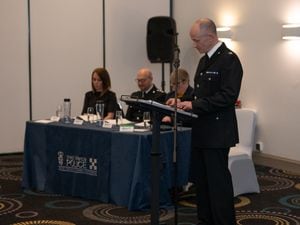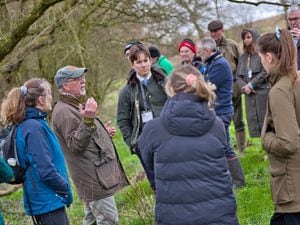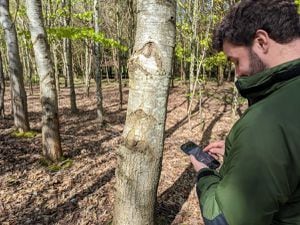Severn Hospice marks 25 years of care
Severn Hospice has been providing specialist care and support to families across Shropshire and North Powys for 25 years. Emma Walker reports.
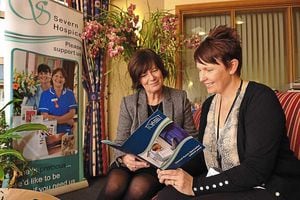
When one man with an incurable illness wanted to die peacefully in his shed, nurses from Severn Hospice made that dream possible.
It is difficult to imagine what communities across Shropshire and North Powys would do without the free specialist care and support provided by the hospice team.
Not only do they offer in-patient care at their sites in Shrewsbury and Telford and a Hospice at Home service, demand is high for the extensive work the team of clinical nurse specialists carry out across our community.
With a growing population and an increasing workload, the hospice team have cared for 23,000 people across Shropshire and Mid Wales since in first opened in 1989.
That is the capacity of Shrewsbury Town, AFC Telford and Welshpool Town's football grounds combined.
Not to forget, it cost £9 million to run Severn Hospice last year – that's £24,657 per day.
A huge £6.26 million of this was through fundraising, grants, money left in wills and the hospice's supporters.
Last year, Severn Hospice received £3.8 million from the NHS and for every £1 the team provided £3 worth of care to local people.
An impressive 401 new patients were helped by the home care team last year, while 3,385 patients were visited at home by the clinical specialist nursing team.
Sarah Hill, who works as one of the hospice's 14 clinical nurse specialists, has a case load of between 25 and 40 patients.
They work alongside doctors and support patients at home with advice and managing complex symptoms.
Many people are not aware that in 2011, Severn Hospice officially took over management of all Shropshire and Powys' former Macmillan community based nurses. These nurses are now part of the clinical nurse specialist team after many years of working in close partnership together.

Sarah said: "If you've got cancer and you've got a nurse coming out to you people think it must be through Macmillan so people donate to Macmillan. We just want everyone to know what services we provide and that we are here if people want to donate into their own community."
Severn Hospice has eight in-patient beds in Telford at Apley Castle and 16 beds at Bicton Heath in Shrewsbury.
Situated in the peaceful and award-winning gardens at Apley Castle, a remembrance book marks the day and name of each person who has passed away under their care.
Heather Palin, director of patient services at Severn Hospice, said: "Hospice care is very specific.
"They would get a different kind of care if elsewhere, for examples in a hospital or a nursing home. There is enormous pressure on hospitals and we provide a service that without, the hospital would have to offer and it would cost them a lot of money."
She added: "There are always patients that touch you more than others.
"There are times that it gets to all of us. We get a lot of comfort from the difference we make.
"You learn to develop coping mechanisms and there is a high level of support for staff and volunteers."
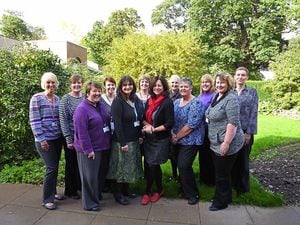
More people wish to die in their own homes and Severn Hospice is responding to that demand.
Ms Palin added: "There is a lot of fear about going to a hospice as it is seen as a place where people go to die.
"At the moment we are developing our community services, more people want to die at home and we are responding to that.
"The community need to know that these teams exist and how they operate.
"This area has just above the national average people dying home."
Hospice staff also work closely with a number of agencies and NHS community groups, such as the rapid response team.
Their youngest patient at Apley Castle has been 19 and the average length a patient stays in one of the wards is 12 days.
Both hospices are considered a centre of excellence for palliative and end of life care.
Thousands of families have felt the benefits of the care provided by Severn Hospice.
Among them is Ian Bowman, whose mother Mary died of cancer aged 65 earlier this year at their ward in Shrewsbury.
He, and a group of friends, raised more than £21,500 from a charity cycle ride including 81 cyclists from Wellington to Aberystwyth – and half of this was donated to Severn Hospice.
Mr Bowman praised the staff who looked after Mrs Bowman during the last weeks of her life.
He added: "I have made it a lifelong ambition to raise money for them.
"Me and my family are so grateful for the staff, they did everything for her at a time that was so tough for my mum. She was made to be as comfortable as she was because of them.
"I stayed there during her last eight nights and it was a wonderful place to be. They made our family feel extremely comfortable during one of the most difficult times we have ever come across.
"It's not just their end of life care that is fantastic, they came to my mother's home where she received care and support and counselling."
It is the second charity bike ride Mr Bowman has organised, after deciding two years ago to put together an event to raise money for charity.
He said he wanted to make the event an annual trip and preparations for the 2015 event would start in the new year.
Money has been raised in the names of hundreds of former hospice patients, including Karen Grayston who asked for something to be done for Severn Hospice before she died.
The Shropshire Art Society raised £5,000 for the hospice team after a successful Art at Ford House event, in memory of Judy Townsend. This year, the team are celebrating their silver anniversary, marking 25 years of being there when it matters most for the people of Shropshire and North Powys.
It first opened its doors to patients in 1989 after a decade of fundraising by founder Sheila Laws.
There are more than 4,000 day hospice attendees a year, and more than one third of inpatients become well enough to be discharged.
Hospice at Home deploys nurses, complimentary therapists and occupational therapists to support patients who want to be cared for and die at home.
And there are 1,000 volunteers that work across both sites in the network of shops and fundraisers.

